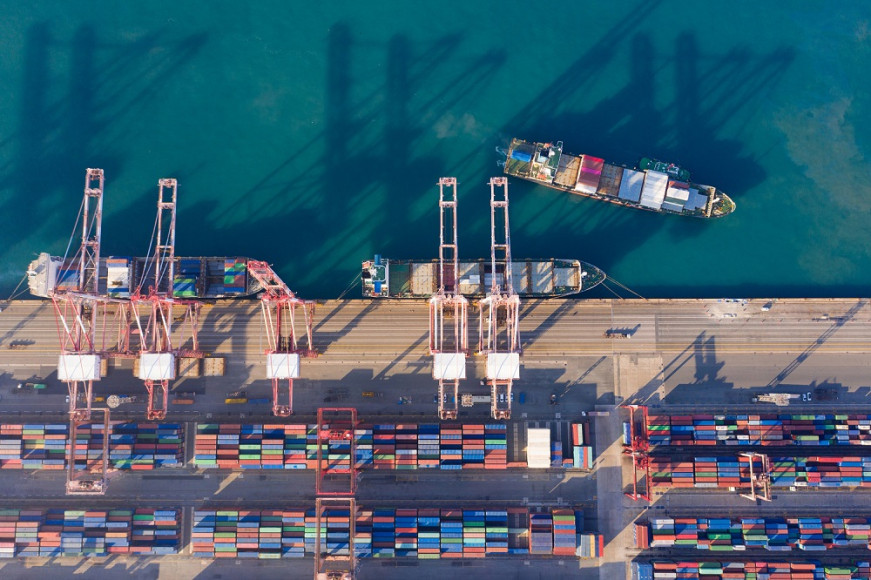In an ever-evolving global landscape, the expectations placed on businesses are continually changing. Today, companies are increasingly accountable for their impact on human rights, the environment, and society at large, and not just for their own operations, but throughout their supply chains as well.
These expectations are not only moral but are also evolving into legal requirements. Legislation and regulations are emerging to ensure that businesses conduct due diligence for their supply chain and take proactive steps to prevent adverse impacts on people and the planet.
With this shifting landscape, it’s important to be prepared for these key legislative developments and the implications they could have for your business. In this blog, we will look at key legislation you need to be aware of and also discuss best practices for supply chain due diligence.
Emerging Legislation
There are clear expectations for businesses to conduct due diligence for their supply chain. For example, the UN Guiding Principles on Business and Human Rights (UNGPs) are the authoritative global standard for preventing and addressing the risk of adverse human rights impacts linked to business and specify that companies should conduct an ongoing process of human rights due diligence (HRDD). The OECD Due Diligence Guidance for Responsible Business Conduct and the OECD Guidelines for Multinational Enterprises provide pragmatic guidance on how businesses are expected to conduct due diligence and assess and address their impacts on people and the planet.
In addition, these and other expectations are becoming legal requirements – evolving from voluntary to mandatory requirements. Of note:
Dodd-Frank – Conflict Minerals:
In 2010, the U.S. Congress passed the “conflict minerals” provision – commonly known as Section 1502 of the Dodd Frank Act. The Act directs the U.S. Securities and Exchange Commission (SEC) to issue rules requiring certain companies to disclosure their use of conflict minerals if those minerals are “necessary to the functionality or production of a product” manufactured by those companies. Under the Act, those minerals include tantalum, tin, gold and tungsten. Under the final rule, companies that are required to file a Conflict Minerals Report must exercise due diligence on the source and chain of custody of their conflict minerals. The due diligence measure must conform to a nationally or internationally recognized due diligence framework, such as the due diligence guidance approved by the OECD.
Uyghur Forced Labor Prevention Act (UFLPA):
In June 2022, the Uyghur Forced Labor Prevention Act (Public Law No. 117-78), also known as the UFLPA, entered into force in the United States. The law aims to deter and punish companies participating in or benefiting from Chinese state-sponsored forced labor in the Uyghur region of Western China. UFLPA establishes a rebuttable presumption that goods produced wholly or in part in the Xinjiang Uyghur Autonomous Region (XUAR) of China, or by certain identified entities, are made with forced labor, and therefore subject to an import prohibition in the United States. UFLPA applies to any company importing goods into the U.S. produced in the XUAR of China.
German Supply Chain Due Diligence Act (LkSG):
In July 2021, the Act on Corporate Due Diligence in Supply Chains (Supply Chain Due Diligence Act) was published in the German Federal Law Gazette. The Supply Chain Due Diligence Act’s objective is to safeguard human rights and the environment in the global economy more effectively. It requires companies with 3,000 or more employees in Germany to take “appropriate measures” to respect human rights and the environment within their supply chains “with the goal to prevent or minimize risks related to human rights or the environment or end the violation of duties related to human rights or the environment. Companies within the scope of the act must set up each of the following due diligence procedures to safeguard human rights and the environment in their global supply chain:
- Policy: Adopt a policy statement on the company’s general human rights strategy.
- Governance: Define internal responsibility for compliance with the risk management system—for example, by appointing a human rights ombudsperson.
- Assess Risk: Carry out regular risk analyses.
- Management: Establish a risk management system.
- Prevention: Implement preventive measures in the company’s own business area, which includes the activities of subsidiaries, if the parent company exerts “decisive influence,” and vis-à-vis its direct suppliers.
- Remediation: Take remedial actions if a violation has already occurred or is imminent.
- Grievance: Set up an internal complaints procedure.
- Due Diligence: Establish due diligence procedures regarding risks associated with indirect suppliers that will be applied when the company has substantiated knowledge of a violation.
- Communicate: Document the company’s due diligence procedures, risks identified, and measures taken, and then publish a yearly report on its website
EU Corporate Sustainability Due Diligence Directive (CS3D) (draft):
In March 2022, the EU published its Draft Directive on Corporate Sustainability Due Diligence, which will require companies to perform due diligence in line with the OECD process. It is currently moving through the EU legislative process and is expected to come into force in 2025. The CS3D has 5 aims:
- Improve corporate governance to integrate sustainability risk management into corporate strategies;
- Avoid fragmentation of due diligence requirements and create legal certainty for businesses and stakeholders;
- Increase corporate accountability for adverse impacts;
- Improve access to remedy for those harmed; and,
- Complement additional, more specific sustainability measures on other topics.
Small and medium-sized enterprises (SMEs) would not be directly in scope, but they could be affected in their capacity as supplier to any of the above companies. Similarly, this regulation may not be directly applicable to US companies, but given the global nature of supply chains, US companies may very well be impacted as a supplier to the above companies.
Best Practices in Supply Chain Due Diligence
The regulations mentioned above are based on the Due Diligence frameworks from the UN Guiding Principles on Business and Human Rights and the OECD Due Diligence Guidance for Responsible Business Conduct.
The OECD Due Diligence Guidance document provides practical guidance to enterprises in applying the OECD Guidelines for Multinational Enterprises. The effective implementation of these recommendations is instrumental in helping companies prevent and address adverse impacts that may be linked to their operations, supply chains, and other business relationships, specifically in areas such as workers, human rights, environmental impacts, bribery, consumer welfare, and corporate governance.
Furthermore, the Guidance's Annex includes supplemental explanations, practical tips, and illustrative examples of due diligence practices. Notably, the OECD Due Diligence Guidance complements the due diligence recommendations found in the UN Guiding Principles on Business and Human Rights and the ILO Tripartite Declaration of Principles Concerning Multinational Enterprises and Social Policy. The figure below illustrates the OECD Due Diligence Process, which is critical for complying with the regulations mentioned in this article.
Source: OECD Due Diligence Guidance for Responsible Business Conduct
Below, we elaborate on each step of the due diligence process, and how companies can use it to comply.
Step 1: Commitment & Integration: Embedding Responsible Business Conduct into Business Processes
To effectively follow the OECD Due Diligence Guidance, a crucial first step is integrating responsible business conduct into your company's core operations. This means making it an intrinsic part of your decision-making processes, procurement strategies, and overall corporate culture. Alongside integration, it's essential to develop a clear and unequivocal commitment to responsible business conduct, which should be articulated in a formal policy. This commitment serves as a guiding framework for your organization and communicates your dedication to ethical and sustainable business practices.
Steps 2, 3, 6: Assessing and Addressing Adverse Impacts
A vital aspect of adhering to the OECD Due Diligence Guidance is conducting a comprehensive risk assessment. This entails identifying potential risks related to human rights violations, environmental harm, bribery, and other adverse impacts that might be associated with your business operations, supply chains, and stakeholder relationships. Once these risks are identified, the next step is to develop and implement effective strategies for risk mitigation and prevention. This involves activities such as supplier engagement, ongoing monitoring, capacity building, and other measures to proactively address and mitigate the identified risks.
Steps 4-5: Transparency & Communication
Transparency is key to demonstrating a company’s commitment to responsible business conduct. It’s important to commit to disclosing the baseline, progress, and impacts over time. This transparency not only builds trust with stakeholders but also holds a company accountable for its actions. In addition, it is critical to establish mechanisms for continuous evaluation and improvement of due diligence processes. This includes communicating and collaborating with stakeholders, staying updated on emerging best practices, and remaining agile in adapting the approach to align with changing circumstances. By consistently pursuing improvement, you ensure that your responsible business conduct efforts remain effective and responsive to the challenges of the modern business world.
In Summary
The legislative developments highlighted above not only establish legal requirements but also emphasize the imperative to integrate sustainability into company supply chains. By embracing international frameworks like the OECD Due Diligence Guidance and implementing best practices in supply chain due diligence, you can help your organization thrive in this evolving landscape. Transparency, accountability, and ethical conduct are not just legal obligations but also powerful tools for building trust with stakeholders and enhancing brand reputation.
Ultimately, responsible business conduct is not just a legal obligation; it's a moral imperative and a path toward a better future for all.
Looking for more support in managing your sustainable supply chain? Connect with our experts today!
Want more news and insights like this?
Sign up for our monthly e-newsletter, The New Leaf. Our goal is to keep you updated, educated, and even a bit entertained as it relates to all things EHS and sustainability.
Have any questions?
Contact us to discuss your environment, health, safety, and sustainability needs today.







